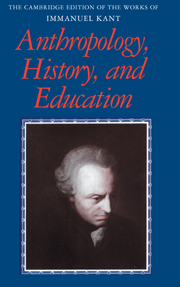Book contents
- Frontmatter
- Contents
- General editors' preface
- Preface
- General introduction
- 1 Observations on the feeling of the beautiful and sublime (1764)
- 2 Essay on the maladies of the head (1764)
- 3 Review of Moscati's work Of the corporeal essential differences between the structure of animals and humans (1771)
- 4 Of the different races of human beings (1775)
- 5 Essays regarding the Philanthropinum (1776/1777)
- 6 A note to physicians (1782)
- 7 Idea for a universal history with a cosmopolitan aim (1784)
- 8 Review of J. G. Herder's Ideas for the philosophy of the history of humanity. Parts 1 and 2 (1785)
- 9 Determination of the concept of a human race (1785)
- 10 Conjectural beginning of human history (1786)
- 11 Some remarks on Ludwig Heinrich Jakob's Examination of Mendelssohn's Morning hours (1786)
- 12 On the philosophers' medicine of the body (1786)
- 13 On the use of teleological principles in philosophy (1788)
- 14 From Soemmerring's On the organ of the soul (1796)
- 15 Anthropology from a pragmatic point of view (1798)
- 16 Postscript to Christian Gottlieb Mielcke's Lithuanian–German and German–Lithuanian dictionary (1800)
- 17 Lectures on pedagogy (1803)
- Editorial notes
- Glossary
- Bibliography
- Index
15 - Anthropology from a pragmatic point of view (1798)
Published online by Cambridge University Press: 05 May 2013
- Frontmatter
- Contents
- General editors' preface
- Preface
- General introduction
- 1 Observations on the feeling of the beautiful and sublime (1764)
- 2 Essay on the maladies of the head (1764)
- 3 Review of Moscati's work Of the corporeal essential differences between the structure of animals and humans (1771)
- 4 Of the different races of human beings (1775)
- 5 Essays regarding the Philanthropinum (1776/1777)
- 6 A note to physicians (1782)
- 7 Idea for a universal history with a cosmopolitan aim (1784)
- 8 Review of J. G. Herder's Ideas for the philosophy of the history of humanity. Parts 1 and 2 (1785)
- 9 Determination of the concept of a human race (1785)
- 10 Conjectural beginning of human history (1786)
- 11 Some remarks on Ludwig Heinrich Jakob's Examination of Mendelssohn's Morning hours (1786)
- 12 On the philosophers' medicine of the body (1786)
- 13 On the use of teleological principles in philosophy (1788)
- 14 From Soemmerring's On the organ of the soul (1796)
- 15 Anthropology from a pragmatic point of view (1798)
- 16 Postscript to Christian Gottlieb Mielcke's Lithuanian–German and German–Lithuanian dictionary (1800)
- 17 Lectures on pedagogy (1803)
- Editorial notes
- Glossary
- Bibliography
- Index
Summary
TRANSLATOR'S INTRODUCTION
In a letter written toward the end of 1773 to his former student Marcus Herz, Kant notes:
This winter, for the second time, I am giving a lecture course on anthropology, which I now intend to make into a proper academic discipline…. The intention that I have is to disclose through it the sources of all the sciences, the science of morals, of skill, of social intercourse, of the method of educating and governing human beings, and thus of everything that pertains to the practical…. I include so many observations of ordinary life that my listeners have constant occasion to compare their ordinary experience with my remarks and thus, from beginning to end, find the lectures entertaining and never dry. In my spare time, I am working on a preparatory exercise for students out of this (in my opinion) very pleasant empirical study of skill, prudence, and even wisdom that, along with physical geography and distinct from all other instruction, can be called knowledge of the world.
(10: 145–6).Kant taught his anthropology course twenty-four times – every winter semester from 1772 until his retirement in 1796. A companion course in physical geography (which he had first offered in 1756, and out of which the anthropology course to some extent grew) was offered in the summer semesters.
- Type
- Chapter
- Information
- Anthropology, History, and Education , pp. 227 - 429Publisher: Cambridge University PressPrint publication year: 2007
- 35
- Cited by

